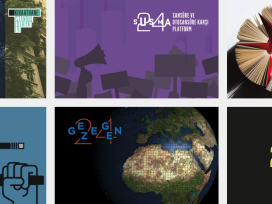WikiLeaks is one of the defining stories of the Internet, which means by now, one of the defining stories of the present, period. At least four large-scale trends which permeate our societies as a whole are fused here into an explosive mixture whose fall-out is far from clear. First is a change in the materiality of communication. Communication becomes more extensive, more recorded, and the records become more mobile. Second is a crisis of institutions, particularly in western democracies, where moralistic rhetoric and the ugliness of daily practice are diverging ever more at the very moment when institutional personnel are being encouraged to think more for themselves. Third is the rise of new actors, “super-empowered” individuals, capable of intervening into historical developments at a systemic level. Finally, fourth is a structural transformation of the public sphere (through media consolidation at one pole, and the explosion of non-institutional publishers at the other), to an extent that rivals the one described by Habermas with the rise of mass media at the turn of the twentieth century.
Leaky containers
Imagine dumping nearly 400 000 paper documents into a dead drop located discreetly on the hard shoulder of a road. Impossible. Now imagine the same thing with digital records on a USB stick, or as an upload from any networked computer. No problem at all. Yet, the material differences between paper and digital records go much further than mere bulk. Digital records are the impulses travelling through the nervous systems of dynamic, distributed organisations of all sizes. They are intended, from the beginning, to circulate with ease. Otherwise such organisations would fall apart and dynamism would grind to a halt. The more flexible and distributed organisations become, the more records they need to produce and the faster these need to circulate. Due to their distributed aspect and the pressure for cross-organisational cooperation, it is increasingly difficult to keep records within particular organisations whose boundaries are blurring anyway. Surveillance researchers such as David Lyon have long been writing about the leakiness of “containers”, meaning the tendency for sensitive digital records to cross the boundaries of the institutions which produce them. This leakiness is often driven by commercial considerations (private data being sold), but it happens also out of incompetence (systems being secured insufficiently), or because insiders deliberately violate organisational policies for their own purposes. Either they are whistle-blowers motivated by conscience, as in the case of WikiLeaks, or individuals selling information for private gain, as in the case of the numerous employees of Swiss banks who recently copied the details of private accounts and sold them to tax authorities across Europe. Within certain organisation such as banks and the military, virtually everything is classified and large number of people have access to this data, not least mid-level staff who handle the streams of raw data such as individuals’ records produced as part of daily procedure.
This basic data processing needs to be efficient, that is, data access and sharing has to be possible. It cannot be restricted by too much red tape, overly stringent security clearance requirements or the too strict compartmentalisation of the data into distinct sets that cannot be connected. After all, this inability to connect data located in different bureaucratic domains was one of the main criticisms coming out the enquires into the 9/11 attacks. There is an inherent paradox. Vast streams of classified records need to flow freely in order to sustain complex, distributed and time-sensitive operations. Yet, since the information is classified, it needs to flow within strict boundaries which cannot be clearly defined on a general level (after all, you never know what needs to get connected with what in advance), and it needs to flow through many, many hands. This creates the techno-organisational preconditions for massive amounts of information to leak out.
WikiLeaks, on the other side of the equation, created a custom-made infrastructure to receive these torrents of records. More than a decade after the heady discussions by cypherpunks who dreamed of total anonymity through full encryption, WikiLeaks managed for the first time to create an effective infrastructure for anonymous communication. Rather than relying purely on technology, they built social intelligence (filtering, editorial control) into the system in order to encourage only one type of anonymous speech – whistle-blowing – while insulating themselves from the usual criticisms of anonymous communication (child-porn trafficking and the like). Yet, the transformation of the materiality of records and the new infrastructures only create possibilities, and cannot single-handedly explain why certain containers are actually very leaky while others are not.
Institutions adrift
Is it a coincidence that so far the vast majority of WikiLeaks’ material has originated from within institutions in democratic systems? I think not. In its rhetoric, Western politics is becoming ever more moralising. Tony Blair was the undisputed master in this discipline. He could speak passionately about “humanitarian wars” which were supposed to advance human rights. Afghanistan was to prosper under the warm attention of allied forces, following decades of neglect and civil war. This time, the invasion was going to develop the country, rebuild infrastructures, liberate women, give children hope and whatnot. The Iraq war – once the weapons of mass destruction turned out to be imaginary – was about liberating the Iraqi people from despotism, bringing democracy to the Middle East and ushering in a new era of peace, rule of law and commercial opportunities. All in all, these were just wars, wars we wanted to fight, wars soldiers could be proud of fighting. To some degree, there is always a gap between political rhetoric and practice, particularly in times of war. Yet, there is a qualitative difference now. Western political systems seem to have lost their ability to construct overarching historical narratives that would justify and give meaning to their actions and make sense of the ugliness that is part of any war. Since the end of the Cold War, politics can no longer be said to pursue a historical project creating a void which has been papered over by empty moralising.
However, if a superficial morality is all that is left, then the encounter with the brutal day-to-day operations of the battle field is unmediated and corrosive. The moral rationale for going to war quickly dissolves under the actual experience of war and what’s left is a cynical machinery run amok. It can no longer generate any lasting and positive identification from its protagonists. In some way, a similar lack of identification can be seen within corporations, as evidenced in the leaks from Swiss banks. With neoliberal ideology dominant, employees are told over and over not to expect anything from the company, that their job is continually in danger and that if they do not perform according to targets they can be replaced at a moment’s notice. There is no greater narrative than the next quarter and generalised insecurity.
This emptying out of institutions takes place in the context of a general transformation of work away from strict hierarchies and the unquestioning execution of commands towards a more involved style of cognitive labour. Thus, people are told to engage more fully with their work, to become more creative, more self-reliant, more entrepreneurial. Simply following orders without investing one’s creativity and personality is no longer enough. Thus, there is a second internal contradiction. People are asked to identify personally with organisations who can either no longer carry historical projects worthy of major sacrifices or expressly regard their employees as nothing but expendable, short-term resources. This, I think, creates the cognitive dissonance that justifies, perhaps even demands, the leaker to violate procedure and actively damage the organisation of which he, or she, has been at some point a well-acculturated member (this is the difference to the spy). This dissonance creates the motivational energy to move from the potential to the actual.
Super-empowered
There is a vast amount of infrastructure – transportation, communication, financing, production – openly available that, until recently, was only accessible to very large organisations. It now takes relatively little – a few dedicated, knowledgeable people – to connect these pieces into a powerful platform from which to act. Military strategists have been talking about ‘super-empowered individuals’ by which they mean someone who
is autonomously capable of creating a cascading event, […] a “system perturbation”; a disruption of system function and invalidation of existing rule sets to at least the national but more likely the global scale. The key requirements to become “superempowered” are comprehension of a complex system’s connectivty and operation; access to critical network hubs; possession of a force that can be leveraged against the structure of the system and a wilingness to use it.
There are a number real weaknesses to this concept, not least that it has thus far been exclusively applied to terrorism and that it reduces structural dynamics to individual actions. Nevertheless, it can be useful insofar as it highlights how complex, networked systems which might be generally relatively stable, posses critical nodes (“systempunkt” in the strange parlance of military strategists) which in case of failure that can cause cascading effects through the entire systems. It also highlights how individuals, or more likely, small groups, can affect these systems disproportionately if they manage to interfere with these critical nodes. Thus, individuals, supported by small, networked organisations, can now intervene in social dynamics at a systemic level, for the better or worse.
This picture fits WikiLeaks, organised around one charismatic individual, very well. It is both its strength and its weakness. Its strength because it has been able to trigger large-scale events quickly and cheaply. If WikiLeaks had required multi-million dollar investment upfront, it would not have been able to get off the ground. Yet, it is also its key weakness, since it remains so strongly centred around a single person. Many of the issues that are typical of small groups organised by a charismatic leader seem to affect WikiLeaks as well, such as authoritarianism, lack of internal procedure, dangers of burnout and internal and external attacks on the credibility of that single person (if not worse). Such charismatic leadership is often unstable and one must suspect that all of the issues – positive because of the super-empowerment, as well as negative because of the pressures baring down on it – are multiplied to an unprecedented scale in the case of WikiLeaks and its leader, Julian Assange. It’s hard to imagine how this can be sustainable.
A new public sphere
The public sphere as an arena for political discourse and a counter-balance to the state has been in decline for a very long time. While it’s unclear when this decline started – Habermas puts it at the beginning of the twentieth century – it’s fairly obvious that it has accelerated since the 1980s, following waves of deregulation and consolidation in the media business. Political and economic pressures led to an increase in the amount of “soft news”, people stories, and commentary and to a decrease in the investigative reporting being conducted. That’s a well-known story. At the same time governments have learned to play the game of access and leaks. Journalists are being skilfully fed with insider information and become increasingly dependent on having access to the centres of power. The embedded journalists at the beginning of the Second Gulf War were the most blatant example of this development. For both sides, this is a good arrangement. For the media, this is much faster and cheaper than doing its own research and for the government, it helps in controlling the story, not only by feeding the information (and even providing “experts” to be interviewed on TV), but also by threatening to withdraw access from journalists and media who don’t tow the line. Last but not least, the legal protections of journalism are effectively weakened, in part because challenges are launched more aggressively, in part because commercial media view critical reporting through the eyes of their risk-averse legal and accounting departments.
In the face of the evident crisis of news media, there has been much hope that the Internet – the blogosphere and citizen journalism – would be able to replace the old, obsolete structures. On the whole, this has not happened, which is not surprising since new media never simply replace old media. What we can see, however, is a slow, structural transformation of the public sphere in which the old news media is complemented by new actors, designed to address the weaknesses of the mainstream media while making use of its core capacity to bring stories to lots of people. All in all, the process of investigative journalism is reorganised and, one can only hope, reinvigorated.
In a news ecology, the traditional news media remains the most important delivery channel for news. It knows best how to package and deliver news effectively. The legal risk associated with publishing sensitive information, however, is outsourced, to WikiLeaks in extreme cases, or to blogs and other operators without assets in normal circumstances. At the same time, there are new sources of funding and investigative journalism outside the main stream media. In the US, Pro-Publica, with philanthropic money from the Knights Foundation, was established in late 2007 as an “independent, non-profit newsroom that produces investigative journalism in the public interest”, because “many news organisations have increasingly come to see it as a luxury.” In April 2010, the Bureau of Investigative Journalism was launched in London with a very similar aim, funded by the Potter Foundation it’s also a not-for-profit. Both units are partnering with traditional news media, print and television, which will carry the stories they investigate. In addition, new collaborative infrastructures, such as DocumentCloud, “an index of primary source documents and a tool for annotating, organizing and publishing them” is providing the infrastructure to cope with very large amounts of materials efficiently across newsrooms and organisational boundaries. The various elements that make up the process of investigative reporting, (protecting the source, doing the time-consuming work of gathering and making sense of information, providing the tools for handling the material, and delivering the story to the public at large), are no longer performed by a single organisation but by a networked set of organisations, mostly dedicated to performing only one of them well, and all based on different economic models but still working together to move the story into the public sphere. Within this new ecology, WikiLeaks is the actor taking on the most risk, which leaves the others relatively free to act within an otherwise highly constrained environment.
In a way, this changes the character of the final product, the news story, as well. It brings traditional reporting – where source material is usually kept unpublished – and blogging, where source material is usually linked to, closer together. Since WikiLeaks publishes the material anyway, many of the newspapers that turn its records into stories do that as well (rather than only quoting a sentence or two). On the whole, this makes the stories more transparent and, frankly, more interesting to read. As far as one can tell already, stories written with DocumentCloud tend to be similar. Whether this amounts to “scientific journalism” as Julian Assange hopes, journalism that publishes its source information the same way that scientists publish raw data and research methods, remains to be seen. But the combination of having access to a highly edited story as well as to sprawling source material could be very powerful.
Fall-out
It’s very hard to assess the fall-out from WikiLeaks, since there are so many variables at play. It’s pretty safe to say leaking will continue to be an important method of informational politics quite aside from the fate of WikiLeaks. What changed with WikiLeaks is the scale of the leaks – both in terms of mass and sensitivity. Rather than playing politics as usual, WikiLeaks is capable of interfering within it and setting its own agenda. But what can it accomplish? The most modest goal stated by Assange is raising the “secrecy tax”. As he wrote a few years ago in an essay on “The Non-linear Effects of Leaks on Unjust Systems of Governance”,
the more secretive or unjust an organisation is, the more leaks induce fear and paranoia in its leadership and planning coterie. This must result in minimization of efficient internal communications mechanisms (an increase in cognitive “secrecy tax”) and consequent system-wide cognitive decline.
The more an organisation has to protect against leaks, the more the internal contradiction between the requirement to share information (to operate efficiently) and that of controlling information (to keep it secret) will become prevalent and negatively affect its capacity to carry out its mission. Assange’s objectives are likely to be realised in this more narrow respect, but it is unclear whether the “tax” will be high enough to limit the power of organisations such as the US military, or whether it will simply need to invest more resources to carry on doing the same thing as before.
Beyond this, much will depend on how long WikiLeaks can operate. The pressures that bear down on it are tremendous and its institutional base seems relatively feeble, despite, or more likely, because of super-empowerment. How far the media partnerships with the new ecology of journalism will support it, is also far from clear. The New York Times, for example, is playing it both ways. It is selectively working with WikiLeaks, but toning down its coverage. Its avoidance of the term “torture” has become so strenuous that even the unpolitical blog BoingBoing mocked it by scripting “The New York Times Torture Euphemism Generator!”. At the same time, the NYT is actively participating in the global smear campaign against Assange. The other mainstream media in the US are more openly hostile and are continuing their spin. Fox News claimed that the Iraq War Log contained information about weapons of mass destruction and one of its commentators demanded that WikiLeaks activists be declared “enemy combatants” and called for “non-judicial action”, meaning targeted killings, against them. As long as the (US) media remains so dependent on insider access to power (to receive the officially leaked information), their willingness to engage fully with the material published by WikiLeaks will be limited. Their engagement, however, will be critical since the interpretation and the political consequences of the leaks will not depend on the facts alone.






